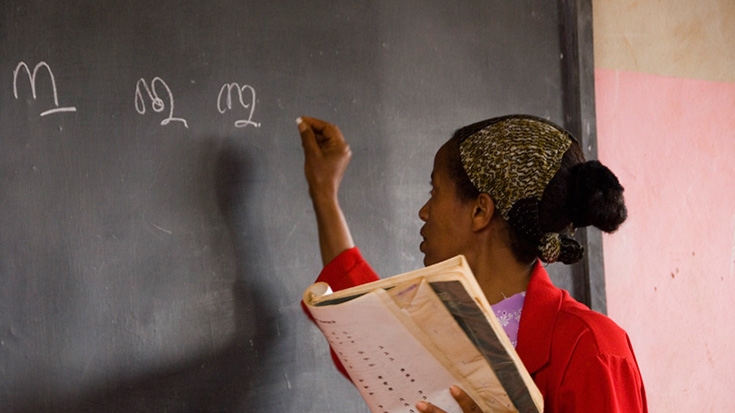ADDIS ABABA, April 6, 2015 – With the primary education enrollment rate having doubled to 90% in the last decade, the Ethiopian government is now working even harder to further increase access to education in underserved areas and improve the overall quality of education.
The General Education Quality Improvement Project (GEQIP), supported by the World Bank Group (WBG), is currently in its second phase, helping to improve the quality of teaching and learning conditions in 40,000 primary and secondary schools across the country. The project provides annual school grants for school improvement programs and supports new policies on curriculum, teacher training, teacher licensing, school inspection and assessment of student learning.
GEQIP has also helped to fill the gap in the provision and quality of textbooks in Ethiopia. More than 78 million textbooks and teachers guides were developed, printed and distributed to all primary and secondary schools, in addition to the development of more than 120 new textbook titles. In order to ensure that the materials meet the needs of specific regions, the textbooks and teacher guides were developed in several regional languages.
Hanna Minasse is one of the 21 million Ethiopian students whose learning lives have been made a little easier by GEQIP.
“I am in 8th grade, my favorite subjects are English and mathematics,” she said. “Because there weren’t enough textbooks for everyone at my school, my 3 friends and I used to have to share our textbooks or try to copy as many pages as possible everyday just to do our homework. It was very hard for us to study. Now we have our own books and they are much better than the old ones. When I grow up I want to be a doctor.”
Through the project, more than 92,000 primary teachers have increased their qualifications from a one-year certificate level (10+1) to a three–year diploma level (10+3) in accordance with newly-adopted regulations. GEQIP has also substantially increased the proportion teachers with a diploma from 3.4% to 43.8% for Grades 1-4, and from 53% to 92% for Grades 5-8 between 2006/2007 and 2012/2013. The proportion of secondary teachers with degrees for Grades 9-12 also increased from 50% to 91% between 2006/2007 and 2012/2013.
In an effort to create a more conducive learning environment, the project also provided grants to more than 38,000 schools under its School Improvement Program (SIP). The SIP is based on priorities identified by parent teacher associations and school boards and approved at the woreda (district) level. The majority of schools have used the grants to rehabilitate/ build infrastructure including separate toilettes for boys and girls, purchase lab equipment and make schools more accessible to people with disabilities.
“Before the ramps where built, I had a very difficult time getting around this school,” said Gutamma Gemechu, a student from Oromia who uses a wheelchair. “I used to ask people to physically lift my wheelchair to get in the building. Now I can take care of myself.”
Guang Zhe Chen, World Bank country director for Ethiopia, said the WBG and other development partners will continue to support the project to help make the education system stronger for students and teachers.
“Under the current phase of the project, the WBG along with the other development partners will continue to work together to provide more students such as Hanna and Gutamma with better education and help them realize their dreams and contribute to the development of the country,” Chen said.


